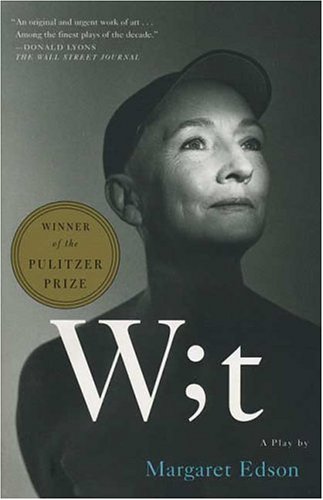
Will John Donne’s “Death Be Not Proud” help one handle the fact that one has cancer? It is significant that the cancer victim and Donne scholar in Margaret Edson’s W;t is rejecting her poet by the end of the play.
I’m actually not sure whether this particular poem would help any cancer patient. There’s a bit too much braggadocio in it for me, as though the poet can override his fears through shear audacity. My reservations about the poem are also those of the play. Wit is all very well, Edson seems to be saying, but can it speak to the heart or to a patient in distress?
In fact, the way that Edson sets up the poet, it’s almost as if Donne stands in for a flight from sentimental emotions. E.M., the protagonist’s graduate school mentor, is a woman in a man’s field and she shows that she is as tough as any man by burying her softer side. Vivian has become the same kind of academic. As Jason, her doctor and former student says,
Listen, if there’s one thing we learned in Seventeenth-Century Poetry, it’s that you can forget about that sentimental stuff. Enzyme Kinetics was more poetic than Bearing’s class. Besides, you can’t think about that meaning-of-life garbage all the time or you’d go nuts.
Donne, as he is portrayed in W;t, is a man who is using his mind to avoid harsh truths. In “Death Be Not Proud,” he uses the force of his brilliance to bury his fear that death has all too much reason to be proud. Vivian detects such fear in Donne’s Holy Sonnet #5. Here it is:
If poysonous minerals, and if that tree,
Whose fruit threw death on else immortall us
If lecherous goats, if serpents envious
Cannot be damn’d; Alas; why should I bee?
Why should intent or reason, borne in mee,
Make sinnes, else equall, in mee, more heinous?
And mercy being easie,’ and glorious
To God, in his sterne wrath, why threatens hee?
But who am I, that dare dispute with thee?
O God, Oh! Of thine onely worthy blood,
And my teares, make a heavenly Lethean flood,
And drowne in it my sinnes blacke memorie.
That thou remember them, some claime as debt,
I thinke it mercy, if thou wilt forget.
As Vivian analyzes the poem, “The speaker of the sonnet has a brilliant mind, and he plays the part convincingly; but in the end he finds God’s forgiveness hard to believe, so he crawls under a rock to hide.
If arsenic and sperpents are not damned, then why is he? In asking the questions, the speaker turns eternal damnation into an intellectual game. Why would God choose to do what is hard, to condemn, rather than what is easy, and also glorious—to show mercy?
Vivian sees the speaker as so overwhelmed by his own sense of sin, and his own worry about God’s judgment, that he arrives at a religiously inaccurate conclusion:
True believers ask to be remembered by God. The speaker of this sonnet asks God to forget. Where is the hyperactive intellect of the first section? Where is the histrionic outpouring of the second? When the speaker considers his own sins, and the inevitablility of God’s judgment, he can conceive of but one resolution: to disppear.
This is a mouthful but the drama going on here is that, just as Donne’s restless intellect won’t let him open himself to simple forgiveness, Vivian is having trouble opening herself up to experiencing her fear, hurt, and confusion. She is trying to master the cancer with her mind and finding herself defeated at every turn. As in the following passage:
Am I in pain? I don’t believe this. Yes, I’m in goddamn pain. (Furious) I have a fever of 101 spiking to 104. And I have bone metastases in my pelvis and both femurs. (Screaming) There is cancer eating away at my goddamn bones, and I did not know there could be such pain on this earth.
At the end of the play Vivian is finally able to open herself to the sentimental support of the “never very sharp” nurse Susie and to distance herself from the doctor, her former student. Here’s what she says after Susie calls her “sweetheart”:
That certainly was a maudlin display. Popsicles? “Sweetheart”? I can’t believe my life has become so . . . corny.
But it can’t be helped. I don’t see any other way. We are discussing life and death, and not in the abstract, either; we are discussing my life and my death, and my brain is dulling, and poor Susie’s was never very sharp to begin with, and I can’t conceive of any other . . . tone.
(Quickly) Now is not the time for verbal swordplay, for unlikely flights of imagination and wildly shifting perspectives, for metaphysical conceit, for wit.
And nothing would be worse than a detailed scholarly analysis. Erudition. Interpretation. Complication.
(Slowly) Now is a time for simplicity. Now is a time for, dare I say it, kindness.
At the end of the book, her old mentor comes by her hospital room (I’m not entirely sure if this is real or if she’s imagining it) and provides both simplicity and kindness: she reads her Margaret Wise Brown’s The Runaway Bunny. I’ll write on the significance of this story in my next post.


One Trackback
[…] December, in writing on Margaret Edson’s play W;t, I noted that I didn’t think John Donne’s famous sonnet “Death Be Not Proud” would be very useful in […]